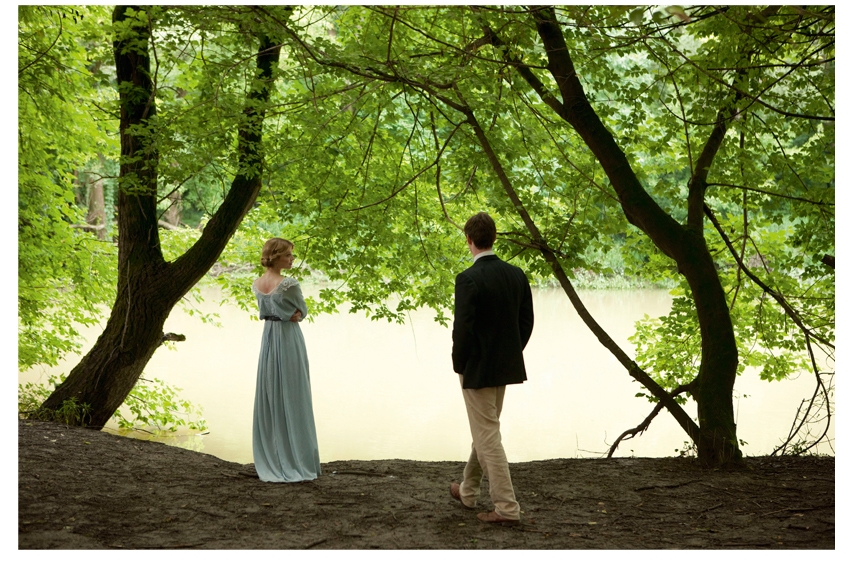My grandfather served in the trenches, but he declined to talk about it. I suppose the horrors had been insupportable. If he had lived day and night with those memories, it might have destroyed the life he built up at home, as a headmaster in a mill town near Manchester. Recently one of his pupils, now very old herself, wrote to me and recalled that he was fair, but very firm. ‘He caned me a few times!’ she wrote, yet seems to have regarded him highly. It opened a window into an alien world, in which a thoroughly decent, respected man might cane a young girl, both regarding it as his duty.
That is one of the problems that is always going to hover over Birdsong (BBC1, Sunday), Sebastian Faulks’s endlessly popular novel. (On the London Tube it has always been as ubiquitous as Captain Corelli’s Mandolin; I have yet to see anyone reading, for example, London Fields by Martin Amis.) It deals with all our main obsessions: love, death and, to some extent, money. And I know of no fiction that so vividly evokes the killing fields, that tells you precisely what it was like to be there, not even All Quiet on the Western Front, and Remarque actually was there.
By contrast, we know all about the life of the upper classes: their rustling bustles are almost as familiar as our own clothes, and the rich man raging at the striking workers is pretty well obligatory in every costume drama up to the middle of the last century. But then we switch to the trenches, and the world there is medieval Japan, or the dark side of the moon, having little to do with the mythic bravery and reserve of Journey’s End, the helpless sarcasm of Oh! What a Lovely War, and the jokey heroics of Blackadder.
We don’t know what to expect; we have no template. The key scene comes when the junior officer Stephen Wraysford, whom we met as a shy, naïve and passionate young man a few years before, has to decide whether a man he caught sleeping on sentry duty — whose son is dying of diphtheria back home — should be court-martialled and almost certainly shot. He decides the man’s fate by the flip of a card, one we saw him shuffling moments before. Deliberate or accidental, the decision seems horribly cynical. How did this appealing, yearning young man get the chip of ice lodged in his heart? But then what was my beloved granddad doing caning young girls 80 years ago? Wouldn’t we have done the same? Probably, but it’s a difficult emotional trip.
This first film production of Birdsong has been hugely praised elsewhere, and I understand why. But I had a few niggles. The thing moved at a stately pace, reverential, I suppose. The production team were like Sotheby’s porters carrying a priceless Chinese vase to the auction room. One slip, and ‘oops, silly me!’ would not have sufficed. As Tinker, Tailor, Soldier, Spy showed in the cinema, it’s easy to confuse slowness with profundity.
And while I am all in favour of close-ups on television, the actor playing Stephen, Eddie Redmayne, is of the Jeremy Irons school of acting, which involves absolutely minimal facial expressions. Stiff upper lip, stiff cheekbones, stiff eyelids, the lot. The camera peers at him, hoping to discover hate, or fear, or love which we, as viewers, have to imprint on his features. It’s oddly disconcerting, even annoying: ‘Come on, I’m a busy man, I have things to do as well!’ you want to yell at the screen as another ten seconds passes.
Jonathan Meades, in his programmes about France, may have decided to eschew the checked tablecloths, the apple-cheeked old ladies, boules in a sun-dappled village square, and other clichés, but of course that is what we like most about France. They may have the TGV, but you never hear British people saying, ‘And we found the most marvellous train that whisked us to Lyon in a couple of hours! You really should try it.’ Or, ‘It’s a little electronics factory, you’d never find it if you didn’t know, tucked away behind the gare in Estreville…’
So thank heavens for Raymond Blanc’s programme The Very Hungry Frenchman, which begins on BBC2 next Thursday. There is no nonsense about avoiding cliché here. He says ‘oh, la, la!’ five times — before the credits. He visits his apple-cheeked old mother. He knocks up delicious regional dishes with the ease you or I might knock up a bowl of Shreddies. It all looks marvellous, and you want to jump into the screen and start eating. Hard to keep in mind the fact that, after the US, France has the highest per capita consumption of McDonald’s of any country on earth.





Comments